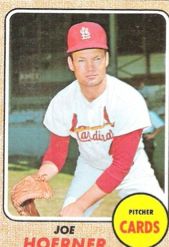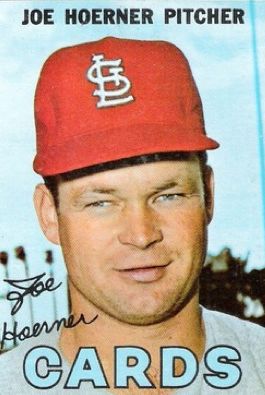Encyclopedia Dubuque
"Encyclopedia Dubuque is the online authority for all things Dubuque, written by the people who know the city best.”
Marshall Cohen—researcher and producer, CNN
Affiliated with the Local History Network of the State Historical Society of Iowa, and the Iowa Museum Association.
HOERNER, Joseph: Difference between revisions
No edit summary |
No edit summary |
||
| Line 1: | Line 1: | ||
[[Image:hoernerbaseball.gif|right|thumb|250px|Joseph Hoerner]]HOERNER, Joseph. (Dubuque, IA, Nov. 12, 1936- Hermann, MO, Oct. 4, 1996). Charter member, the Dubuque Baseball Hall of Fame. While a student at [[DUBUQUE SENIOR HIGH SCHOOL]], Hoerner joined the baseball team as an outfielder. The coach, [[NORA, James|James NORA]], however, soon had him pitching. (1) It was Hoerner's pitching that helped earn the school the 1954 summer baseball championship. (2) His family contained many athletes. His older brother, Bob, played in the farm system of the Chicago Cubs and his younger brother, Jim, received a tryout with the Chicago White Sox but chose not to pursue a professional baseball career. His cousins [[ | [[Image:hoernerbaseball.gif|right|thumb|250px|Joseph Hoerner]]HOERNER, Joseph. (Dubuque, IA, Nov. 12, 1936- Hermann, MO, Oct. 4, 1996). Charter member, the Dubuque Baseball Hall of Fame. While a student at [[DUBUQUE SENIOR HIGH SCHOOL]], Hoerner joined the baseball team as an outfielder. The coach, [[NORA, James|James NORA]], however, soon had him pitching. (1) It was Hoerner's pitching that helped earn the school the 1954 summer baseball championship. (2) His family contained many athletes. His older brother, Bob, played in the farm system of the Chicago Cubs and his younger brother, Jim, received a tryout with the Chicago White Sox but chose not to pursue a professional baseball career. His cousins [[HOERNER, Lester Adam "Dick|Lester Adam "Dick" HOERNER]] and [[REILLY, C. Michael "Mike"|C. Michael "Mike" REILLY]] played professional football. (3) | ||
A strong left-handed reliever in the major leagues during the 1960s and 1970s, Joseph Hoerner played professional baseball with five teams in a career that spanned twenty-one years. | A strong left-handed reliever in the major leagues during the 1960s and 1970s, Joseph Hoerner played professional baseball with five teams in a career that spanned twenty-one years. | ||
Revision as of 04:10, 11 December 2013
HOERNER, Joseph. (Dubuque, IA, Nov. 12, 1936- Hermann, MO, Oct. 4, 1996). Charter member, the Dubuque Baseball Hall of Fame. While a student at DUBUQUE SENIOR HIGH SCHOOL, Hoerner joined the baseball team as an outfielder. The coach, James NORA, however, soon had him pitching. (1) It was Hoerner's pitching that helped earn the school the 1954 summer baseball championship. (2) His family contained many athletes. His older brother, Bob, played in the farm system of the Chicago Cubs and his younger brother, Jim, received a tryout with the Chicago White Sox but chose not to pursue a professional baseball career. His cousins Lester Adam "Dick" HOERNER and C. Michael "Mike" REILLY played professional football. (3)
A strong left-handed reliever in the major leagues during the 1960s and 1970s, Joseph Hoerner played professional baseball with five teams in a career that spanned twenty-one years.
Hoerner signed with the Chicago as an amateur free agent in 1957. (4) He was drafted by the Cardinals from the Houston Astros in the 1965. The left-handed side-armer's best seasons came with St. Louis (1966-69) when they won two National League pennants and the 1967 World Series. (5) In game 3 of the 1968 World Series, he became the first player in MLB history to get a hit in a World Series without having collected a hit in the regular season. In four seasons with St. Louis (1966-1969) Hoerner pitched in 206 games with a 19-10 record and 60 saves. He ranked in the National League TOP TEN all four seasons for saves, and three times for games finished. On July 22, 1966 at Wrigley Field he hit his only major league home run, a 3-run shot, against Hall of Famer Ferguson Jenkins. During this time he also tied a National League record for relievers with 6 consecutive strikeouts vs. the Mets on June 1, 1968. He appeared in five World Series games for the Cards, with a 0-1 record and one save.
Hoerner was traded to Philadelphia as part of the infamous Curt Flood deal on October 7, 1969. He made the National League All-Star team in 1970, and his .643 winning percentage ranked sixth in the league. As a Philadelphia Phillie, he was chosen for the 1970 National League All-Star pitching staff by the late Gil Hodges. During 1971 that year he gave up Willie Mays's major league-leading 22nd and last career extra-inning home run at Candlestick Park. In 1971, at age 34, he finished the year with a 1.97 ERA. He was bought by Kansas City on June 15, 1972. In 1970 he was selected as a member of the National League All-Star pitching staff. (6) His final major league appearance was on August 5, 1977. At the age of 40, he was the second-oldest player to appear in a National League game that season.
For his career, Hoerner finished with a lifetime record of 39-34, 99 saves, 268 games finished, and an earned run average of 2.99. He struck out 412 and walked 181 In 562.2 innings pitched. Hoerner held All-Stars Bobby Bonds, Johnny Callison, Tommy Harper, Ed Kranepool, Joe Pepitone, and Bill White to a .070 collective batting average (5-for-71). He also held Hall of Famers Hank Aaron, Ernie Banks, Reggie Jackson, Willie Mays, Bill Mazeroski, Tony Perez, Willie Stargell, and Carl Yastrzemski to a .101 collective batting average (9-for-89).
He remembered with fondness consistently striking out such great players as Willie Stargell and was 21-0 against the legendary Hank Aaron. He is remembered for never complaining about being traded and his remark that "baseball has been good to me." (7) He was also known for frequent visits to children and hospitals and VIETNAM WAR veterans. (8) ---
Source:
1. Cooper, Brian. "Joe Hoerner," Society for American Baseball Research, Online: http://sabr.org/bioproj/person/5eb97f64
2. Tigges, John. They Came From Dubuque, Dubuque, Iowa: Kendall/Hunt Publishing Company, 1983, p. 6.
3. Cooper, Brian.
4. "Joe Hoerner," Baseball-Reference.com. Online: http://www.baseball-reference.com/players/h/hoernjo01.shtml
5. Cooper, Brian.
6. Tigges, John, p. 7
7. Ibid.
8. Cooper, Brian
Baseball Almanac. http://www.baseball-almanac.com/players/player.php?p=hoernjo01
Wikipedia




